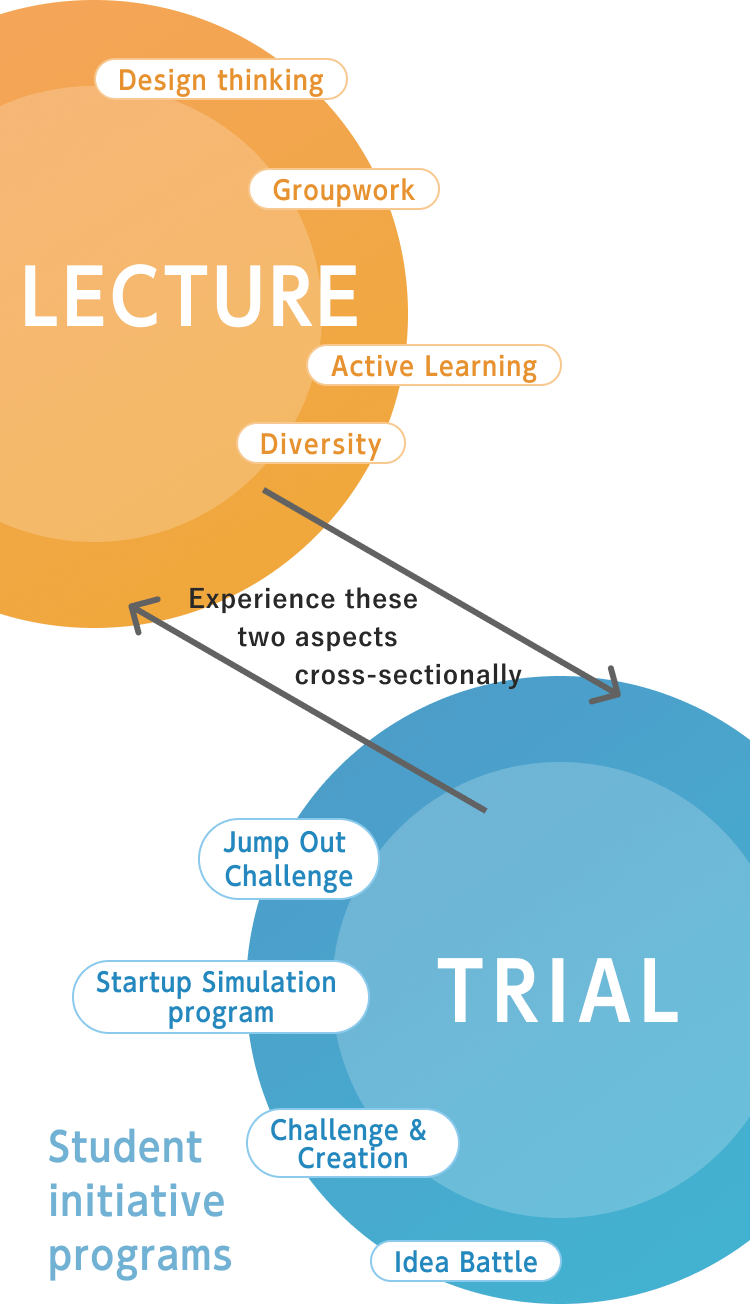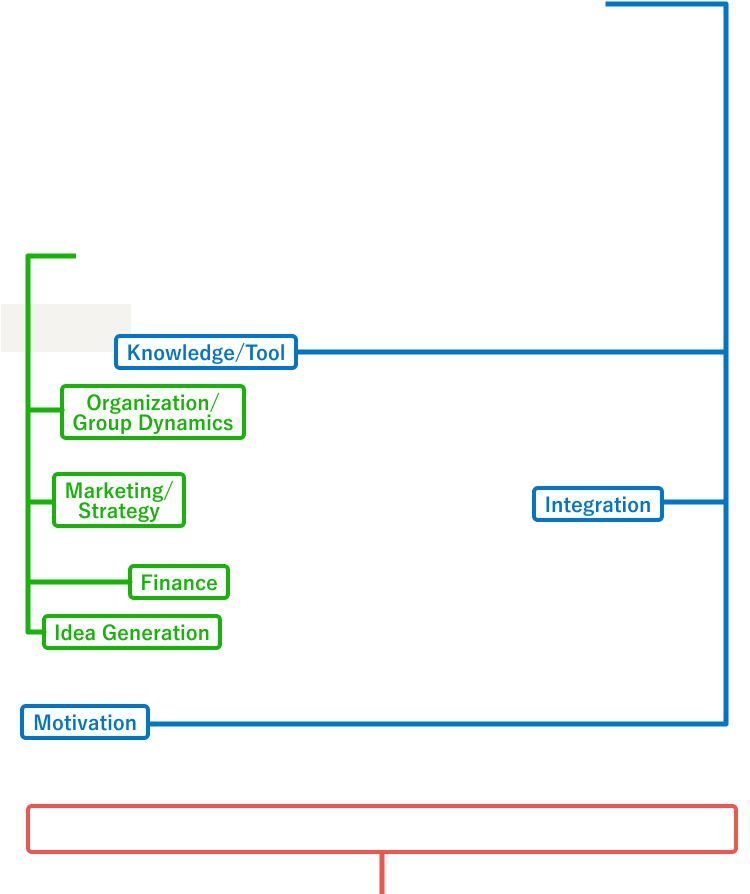Characteristics and Curriculum
Aims of the educational program
QREC's educational program is designed to take students to the stage where they begin to "take action" of their own volition. In other words, QREC aims to educate students to "think and act with entrepreneurship."
To this end, QREC aims to offer a wide variety of programs in a comprehensive and integrated manner. This is organized into two major initiatives.
- Courses that can be taken for credit as regular courses and are offered or recommended by QREC (hereinafter referred to as "QREC courses")
- Other programs that do not offer credit but provide students with opportunities for practice
In [2] above, there are programs that support students' creative activities, internship programs that assume partnerships or collaboration with institutions and companies that promote entrepreneurship, such as business incubators (BI) and venture capitalists (VC) in Japan and abroad, and events for joint development. We also offer internship programs and jointly developed events.
Opportunity
QREC offers two major
opportunities: classes and trials.

Characteristics and System of Subjects
Characteristics of subjects
- Japan's first comprehensive entrepreneurship education program, systematically and step-by-step from basics to application and practice
- Across the entire Kyushu University campus, from first-year undergraduate students to master's, doctoral, and professional graduate programs
- Credit can be earned in all courses. By taking a maximum of two courses per semester, students can take a comprehensive course load of QREC courses in the six years from the first year of undergraduate study to the second year of master's study, without interrupting their specialized courses.
System of subjects
QREC subjects are designed and organized from the following three perspectives
- Step-by-step educational program from basics to practice
- Educational programs designed to cultivate problem consciousness (awareness) to the development of integrated skills
- Educational program consisting of four subject areas covering entrepreneurship

- Step-by-step educational program from basics to practice
- Educational programs designed to cultivate problem consciousness (awareness) to the development of integrated skills
- Educational program consisting of four subject areas covering entrepreneurship
-
1
Step-by-step educational program from basics to practice
In the figure, from left to right in the horizontal direction.
-
Basis:
Theory-based education, combining classroom lectures and group work.
-
Application:
Education that includes exercises such as group discussions, using case studies, etc.
-
Practice:
Education based on actual project participation on an individual or team basis.
It is generally referred to as Action Learning (A.L.) or Project-based Learning (PBL).
The "Basic," "Applied," and "Practical" courses are designed for first- and second-year undergraduate students, third- and fourth-year undergraduate students and master's degree students, and doctoral or professional graduate students (with work experience), respectively, corresponding to the year or stage of study.
-
-
2
Educational programs designed to cultivate problem consciousness (awareness) to the development of integrated skills
In the figure, diagonally from lower left to upper right.
-
Motivation (green area in the figure):
Aimed at cultivating and fostering problem consciousness (awareness), such as the discovery, recognition, and awareness of social problems, or the expansion of creativity.
-
Knowledge/Tool (violet portion in figure):
The goal is to acquire the necessary basic knowledge and methods that can be used to solve problems.
-
Integration (orange portion in the figure):
The goal is to acquire the ability to integrate and synthesize acquired knowledge and to solve problems by utilizing the knowledge and tools appropriate to each issue.
Integration is almost at the "practical" stage and aims to develop practical problem-solving skills in a specialized way according to the final career design of students, such as engineers in charge of new product development for major companies, social entrepreneurs, and policy makers involved in the creation of new industries. The program aims to cultivate practical problem-solving skills in a specialized way.
-
-
3
Educational program consisting of four subject areas covering entrepreneurship
In the figure, surrounded by four vertical squares
-
Idea Generation:
A type of person who "notices" a problem by facing facts without being bound by common sense, and uses divergent ways of thinking, etc., to demonstrate creativity.
-
Organization/Group Dynamics:
For a project to be successful, the participating members need to demonstrate their abilities as a team. Especially in entrepreneurship, it is necessary to expand the organization from one person to two or three. From there, it is necessary to expand the organization to 5, 10, 30, or 100 people in a short period of time and manage it.
Generally, team building
-
Marketing/Strategy:
It is necessary to consider a variety of strategies to ensure the success of the project and to adopt the best strategy among them. To do so, we need to know our customers, competitors, and market trends.
-
Finance:
Funds must be raised to carry out the project. The best way to raise funds depends on the size of the organization and the progress of the project. In this typology, you will learn about how to raise the necessary money.
*Each of the four types of learning occurs independently, but ultimately all are closely interrelated. For example, without a thorough market analysis, a social problem cannot be discovered, and to truly solve that problem, it is necessary to increase the number of participants and supporters and to organize them. On the other hand, organizing requires funding, and unless you can convince funders of what potential demand you are addressing and what strategies you will use to address it, you will not be able to raise money. Thus, it is necessary to consider the above four types flexibly and in conjunction with each other as appropriate.
-
Subjects
The QREC offerings consist of the following five subject groups
- General courses
- Senior year core education courses
- Graduate School Core Courses (Developmental Courses )
- Courses offered by the Graduate School of Economics, Division of Industrial Management(hereinafter referred to as "QBS courses")
- Other subjects
-
1,2,3
1. "General courses"
2. "Senior year core education courses"
3. "Graduate School Core Courses (Development Courses)"
Credit recognition is applied in each faculty and graduate school. Whether or not a course can be counted as a requirement for graduation or completion depends on each faculty and graduate school. In addition to the Graduate School Core Courses, graduate students may also take General courses and Senior year core education courses (except for some courses).
-
4
4. "QBS courses"
This course can be taken by students affiliated with a graduate school with an introduction from QREC and approval from QBS. Credit will be granted in accordance with each graduate school's regulations and procedures.
-
5
5. "Other subjects"
Other Courses" is a generic term for courses other than "General courses," "Senior year core education courses," "Graduate School Core Courses (Development Courses)," and "QBS courses." For credit accreditation of "Other courses," confirmation by each faculty and graduate school is required for each course.
QREC aims to improve educational effectiveness through mutual enlightenment among a wide variety of students by having both undergraduate and graduate students (including working students) take courses across departments and majors.
For this reason, some QREC courses are assigned multiple course types for one QREC course: "General courses," "Senior year core education courses," "Graduate School Core Courses (Development Courses)," and some "QBS courses."

Completion of the specified courses and number of courses in the QREC course group,
QREC can issue a "Certificate of Completion" to those who wish to do so.
If you take "General courses" or "Senior year core education courses" as an undergraduate student and then enter graduate school, take the same courses as "Graduate School Core Courses (Development Courses)" (or some "QBS courses"), you can earn credits at both the undergraduate and graduate schools. (However, the credit accreditation is subject to the regulations of the respective undergraduate and graduate schools.)
However, duplicate enrollment is not recommended. Also, please note that it will only count as one course for the QREC "Certificate of Completion" requirement.
For example, if a student enrolls in an undergraduate course and takes it as a General courses. After that, if a student enters graduate school and takes a course as a Graduate School Core Courses (Development Courses), it is possible to count it as a credit in both the undergraduate and graduate school. However, please note that the credits for the QREC Certificate of Completion will only count as one course, even if both courses have been taken.
Educational Methods and Evaluation
Innovative Educational Methods
-
Workshop format
Most of QREC's classes are not one-way classroom lectures, but rather participatory lectures (workshop style) that provide opportunities for interactive dialogue with the instructor, group discussions, and student presentations. Many courses have two consecutive 180-minute classes, which encourages students to think and act on their own.
-
Invited lectures by practitioners
QREC offers a number of lectures by invited practitioners who are active in the real world (entrepreneurs as well as those working in industry, government, and academia). In addition to classroom lectures, we also provide realistic lectures based on the experiences of practitioners in order to promote student understanding.
-
Case study
The course will focus on basic and applied skills and will be taught using cases. In case studies, students learn practical skills that are linked to problem solving, which cannot be obtained by learning theory alone, through simulated experiences such as learning facts that have actually occurred and specific models that are closer to reality.
-
PBL (Project Based Learning)
In the lectures and various educational projects that are positioned in the practical part of the QREC curriculum, we are increasing the number of courses that take the PBL method of practical learning in small groups in order to learn how to realize ideas and technologies as concrete values in the real world, rather than just receiving lectures as knowledge. We are increasing the number of PBL courses.
Educational Evaluation
In an effort to improve the quality of QREC's lectures, QREC has adopted several educational evaluation methods.
-
Student educational evaluation questionnaire
In order to improve the quality of QREC lectures through the PDCA cycle, QREC conducts its own student education evaluation questionnaires from various perspectives in all courses, in addition to the university-wide education questionnaire conducted by the university's academic affairs department.
-
Conduct student education evaluation meetings
Assessment meetings are held to confirm student opinions and evaluations that cannot be ascertained through questionnaires alone.
-
Conducting educational assessment analysis
By analyzing the correlations among the collected QREC course students' grades, affiliations, and questionnaire content, we are conducting research to measure the effectiveness of education and to make it more effective.


